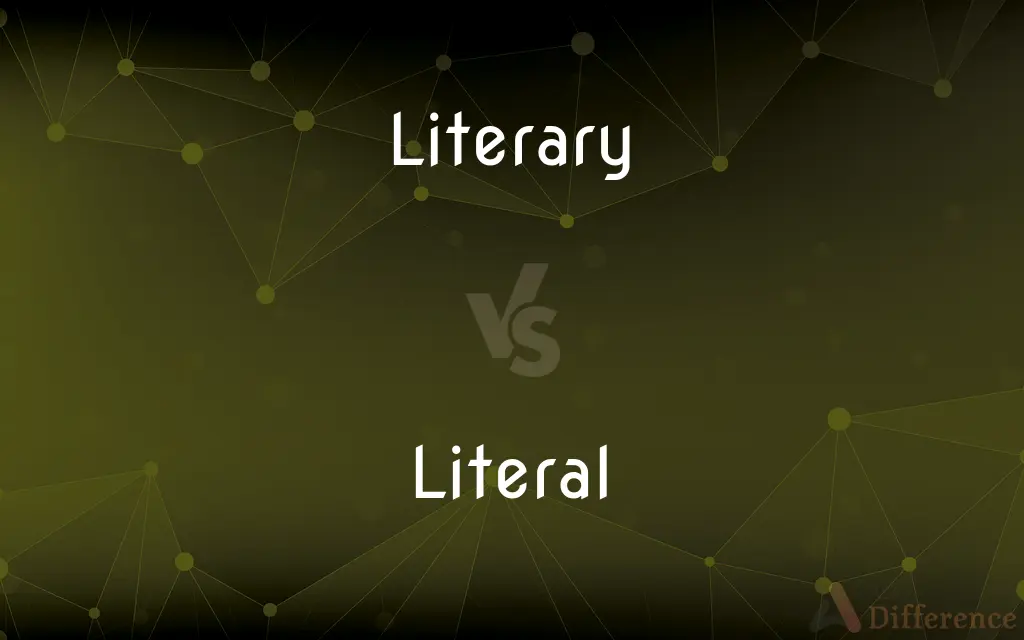Literary vs. Literal — What's the Difference?
By Urooj Arif & Fiza Rafique — Updated on March 8, 2024
Literary refers to relating to literature or writing with artistic merit, focusing on imaginative or symbolic use of language, while literal denotes the exact, straightforward meaning without embellishment.

Difference Between Literary and Literal
Table of Contents
ADVERTISEMENT
Key Differences
Literary language is often characterized by its use of figures of speech, such as metaphors, similes, and personification, to evoke emotions, create vivid imagery, or convey complex ideas in an imaginative way. This type of language is commonly found in poems, novels, and other forms of literature where artistic expression is valued. On the other hand, literal language is used to express facts or ideas directly and clearly, without the use of any embellishments or figures of speech. It is the language of manuals, textbooks, and most non-fiction writing, where clarity and directness are paramount.
While literary works aim to engage the reader's imagination and emotions, often exploring themes or characters in depth, literal language serves to inform or instruct the reader by presenting information in a straightforward and unambiguous manner. Whereas literary texts might leave room for interpretation and multiple meanings, texts written in a literal manner typically aim for a single, clear interpretation to ensure that the message is understood exactly as intended.
One of the key differences between literary and literal language is the reader's engagement level. Literary texts often require a higher level of engagement, inviting readers to explore beneath the surface level of the text to uncover deeper meanings. On the other hand, literal texts prioritize ease of understanding, making it easier for the reader to quickly grasp the intended information without needing to interpret or analyze the text's deeper meanings.
Literary language is used to create art and evoke an aesthetic response from the reader, often transporting them to different times, places, or realms of imagination. In contrast, literal language is primarily used in everyday communication, academic writing, and professional documents, where the goal is to convey information efficiently and accurately, without leaving room for misinterpretation.
Comparison Chart
Definition
Relates to literature, artistic writing
Denotes exact, straightforward meaning
ADVERTISEMENT
Use
Imaginative, symbolic
Clear, direct, without embellishment
Examples
Novels, poetry
Manuals, textbooks
Reader Engagement
High, requires interpretation
Low, focuses on clarity
Purpose
Artistic expression, evoke emotions
Inform, instruct, convey information clearly
Compare with Definitions
Literary
Aims to evoke emotional responses.
The novel's literary quality lies in its power to move readers.
Literal
Expressing the exact meaning of words.
The instructions were written in clear, literal language.
Literary
Reflects on human experiences artistically.
Literary works like To Kill a Mockingbird offer profound insights into society.
Literal
Focused on factual accuracy.
The report's literal description of events leaves no room for doubt.
Literary
Uses figurative language to convey meaning.
The literary device of metaphor enriches the text's imagery.
Literal
Used in practical, informative texts.
User manuals employ literal language for clarity.
Literary
Encourages deep analysis and interpretation.
Literary critics often explore the symbolism in a work's themes.
Literal
Without use of metaphor or exaggeration.
He took her words in their most literal sense.
Literary
Pertaining to literature or creative writing.
Shakespeare's plays are celebrated for their literary genius.
Literal
Aims for straightforward communication.
Legal documents are written with literal precision to avoid ambiguity.
Literary
(of language) associated with literary works or other formal writing; having a marked style intended to create a particular emotional effect
The script was too literary
Literal
Conforming or limited to the simplest, nonfigurative, or most obvious meaning of a word or words.
Literary
Concerning the writing, study, or content of literature, especially of the kind valued for quality of form
The great literary works of the nineteenth century
Literal
Word for word; verbatim
A literal translation.
Literary
Of, relating to, or dealing with literature
Literary criticism.
Literal
Avoiding exaggeration, metaphor, or embellishment; factual; prosaic
A literal description.
A literal mind.
Literary
Of or relating to writers or the profession of literature
Literary circles.
Literal
Consisting of, using, or expressed by letters
Literal notation.
Literary
Versed in or fond of literature or learning.
Literal
A letter or symbol that stands for itself as opposed to a feature, function, or entity associated with it in a programming language
$ can be a symbol that refers to the end of a line, but as a literal, it is a dollar sign.
Literary
Appropriate to literature rather than everyday speech or writing.
Literal
Exactly as stated; read or understood without additional interpretation; according to the letter or verbal expression; real; not figurative or metaphorical, and etymonic rather than idiomatic.
The literal translation is "hands full of bananas" but it means "empty-handed".
Literary
Bookish; pedantic.
Literal
Following the letter or exact words; not free; not taking liberties
A literal reading of the law would prohibit it, but that is clearly not the intent.
Literary
Relating to literature.
Literary fame
A literary history
Literary conversation
Literal
(theology) (broadly) That which generally assumes that the plainest reading of a given scripture is correct but which allows for metaphor where context indicates it; (specifically) following the historical-grammatical method of biblical interpretation
Literary
Relating to writers, or the profession of literature.
A literary man
Literal
(uncommon) Consisting of, or expressed by, letters (of an alphabet)
A literal equation
Literary
Knowledgeable of literature or writing.
Literal
(of a person) Unimaginative; matter-of-fact
Literary
Appropriate to literature rather than everyday writing.
Literal
(proscribed) Used non-literally as an intensifier; see literally for usage notes.
Telemarketers are the literal worst.
Literary
Bookish.
Literal
A misprint (or occasionally a scribal error) that affects a letter.
Literary
Of or pertaining to letters or literature; pertaining to learning or learned men; as, literary fame; a literary history; literary conversation.
He has long outlived his century, the term commonly fixed as the test of literary merit.
Literal
(programming) A value, as opposed to an identifier, written into the source code of a computer program.
Literary
Versed in, or acquainted with, literature; occupied with literature as a profession; connected with literature or with men of letters; as, a literary man.
In the literary as well as fashionable world.
Literal
(logic) A propositional variable or the negation of a propositional variable. Wp
Literary
Of or relating to or characteristic of literature;
Literary criticism
Literal
According to the letter or verbal expression; real; not figurative or metaphorical; as, the literal meaning of a phrase.
It hath but one simple literal sense whose light the owls can not abide.
Literary
Knowledgeable about literature;
A literary style
Literal
Following the letter or exact words; not free.
A middle course between the rigor of literal translations and the liberty of paraphrasts.
Literary
Appropriate to literature rather than everyday speech or writing;
When trying to impress someone she spoke in an affected literary style
Literal
Consisting of, or expressed by, letters.
The literal notation of numbers was known to Europeans before the ciphers.
Literal
Giving a strict or literal construction; unimaginative; matter-of-fact; - applied to persons.
Literal
Literal meaning.
Literal
A mistake in printed matter resulting from mechanical failures of some kind
Literal
Being or reflecting the essential or genuine character of something;
Her actual motive
A literal solitude like a desert
A genuine dilemma
Literal
Without interpretation or embellishment;
A literal translation of the scene before him
Literal
Limited to the explicit meaning of a word or text;
A literal translation
Literal
Lacking stylistic embellishment;
A literal description
Wrote good but plain prose
A plain unadorned account of the coronation
A forthright unembellished style
Literal
Of the clearest kind; usually used for emphasis;
It's the literal truth
A matter of investment, pure and simple
Literal
(of a translation) corresponding word for word with the original;
Literal translation of the article
An awkward word-for-word translation
Common Curiosities
How does literal language differ from literary?
Literal language conveys exact, straightforward meanings without the use of figurative or embellished language.
What defines literary language?
Literary language is associated with literature and artistic writing, using figurative and symbolic language to convey deeper meanings.
Are metaphors and similes only used in literary language?
They are primarily features of literary language but can occasionally be used in literal contexts for clarity or emphasis.
Can understanding literary language improve one's reading skills?
Yes, it can enhance analytical and critical thinking skills, as well as appreciation for artistic expression.
When is literal language preferred?
In contexts requiring clarity and precision, such as in academic writing, manuals, and legal documents, to avoid misinterpretation.
Can a text be both literary and literal?
A text can contain elements of both, but it typically leans more towards one based on the author's intent and the context.
Why is literary language important?
It enhances artistic expression and emotional engagement, inviting readers to explore complex ideas and human experiences.
How does the use of literary language affect reader engagement?
It requires and stimulates deeper engagement, encouraging interpretation and emotional response.
Does the use of literal language simplify complex ideas?
Yes, it can make complex ideas more accessible by presenting them in a straightforward, clear manner.
Why might a writer use literal language in a novel?
To convey specific details or facts within the narrative clearly and without ambiguity.
How does cultural context influence the interpretation of literary language?
Cultural context can significantly impact how literary language is interpreted, as it shapes the understanding of symbols and themes.
Is one type of language better than the other?
Neither is inherently better; the choice depends on the writer's purpose and the context in which the language is used.
Can literary language be ambiguous?
Yes, it often intentionally leaves room for multiple interpretations to engage the reader's imagination and analytical skills.
Is the appreciation of literary language subjective?
Yes, individual responses to literary language can vary widely based on personal experiences, cultural background, and personal taste.
How do authors choose between literary and literal language?
The choice is based on the message they wish to convey and the effect they want to achieve with their audience.
Share Your Discovery

Previous Comparison
Red vs. Vermilion
Next Comparison
Stateful vs. StatelessAuthor Spotlight
Written by
Urooj ArifUrooj is a skilled content writer at Ask Difference, known for her exceptional ability to simplify complex topics into engaging and informative content. With a passion for research and a flair for clear, concise writing, she consistently delivers articles that resonate with our diverse audience.
Co-written by
Fiza RafiqueFiza Rafique is a skilled content writer at AskDifference.com, where she meticulously refines and enhances written pieces. Drawing from her vast editorial expertise, Fiza ensures clarity, accuracy, and precision in every article. Passionate about language, she continually seeks to elevate the quality of content for readers worldwide.














































